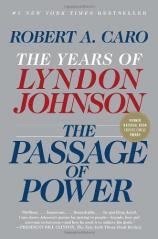The Passage of Power: The Years of Lyndon Johnson
Review
The Passage of Power: The Years of Lyndon Johnson
Since 1976, biographer Robert A. Caro has chronicled the life of Lyndon Baines Johnson, the 36th President of the United States. THE PASSAGE OF POWER is the fourth installment of what will be a five-volume series. It has been an extraordinary undertaking and a remarkable achievement. Thus far, more than 3,000 pages of noteworthy history have sprung from the ancient Smith-Corona typewriter that Caro stubbornly continues to use to produce his compelling writing. Describing these books as simply a biography of Lyndon Johnson is inadequate. To read them is to read about America, from the New Deal to the Vietnam War. In each title, Johnson’s life --- from Texas college student to U.S. Senator and finally to President --- is simply a canvas for Caro’s vivid and insightful word portraits of American history and the people and institutions of the middle third of the 20th century.
"It is difficult to find words to describe THE PASSAGE OF POWER. All of us at one time have engaged in a theoretical discussion of what books we would take with us if we were stranded on a desert island. Caro’s biography of Lyndon Johnson certainly would be in my box of desert island books."
The first three volumes of Caro’s opus trace the rise of Johnson from the impoverished Hill Country of Texas to the position of Majority leader in the U.S. Senate. In each installment, there are significant detours as the author takes time to portray for readers other important figures in the Johnson era. From political players in Roosevelt’s New Deal to the politicians who played crucial roles in that historical era, Caro informs readers about many fascinating individuals who interacted with Johnson in Texas and Washington, D.C. His writing on Sam Rayburn, the powerful Speaker of the House and Johnson’s mentor, could almost be a stand-alone biography. The first 100 pages of MASTER OF THE SENATE are devoted to a history of the U.S. Senate that is as illustrative and insightful today as when it was written in 2002. Anyone seeking to understand the political gridlock of contemporary Washington, D.C. should read Caro’s Senate history.
THE PASSAGE OF POWER opens in 1959 as Johnson, now the second-most powerful man in Washington, seeks the Presidency. His 1960 campaign was doomed for failure by two critical errors committed by the normally politically astute LBJ. First, he overestimated his ability to secure the nomination by a stealth non-campaign. More importantly, he completely underestimated the political skill and ability of Massachusetts Senator John F. Kennedy as well as the Kennedy campaign machine. At the Democratic convention, their strategy and tactics allowed Kennedy to secure sufficient delegates to win a first-ballot nomination for President.
Caro devotes substantial time to the selection of Johnson as the vice-presidential candidate. Was the offer made because the Kennedys believed it would be declined? After Johnson accepted, did the Kennedys pressure him to withdraw his acceptance? Even with the passage of 50 years, there has never been a definitive answer to these questions. Caro presents readers with a great deal of information but does not seek to answer the questions. However, one thing is certain: Kennedy’s election in 1960 would not have occurred without Johnson as his running mate.
Upon assuming the office of Vice President, Johnson was a troubled man. He had little responsibility and, despite his braggadocio, was perpetually concerned that he would be removed from the ticket in 1964. He believed his political career had come to an end until the fateful events of November 22, 1963, when an assassin’s bullet made him President.
All of Johnson’s fears and insecurities vanished once he assumed the Presidency. The take-charge man who counted votes with meticulous care and cajoled reluctant voters using every possible method he knew turned his attention to passing the 1964 Civil Rights Act. Many of his old political allies counseled him to go slow on civil rights. Even though the cause was just, it was a difficult uphill struggle. Johnson would not be swayed. He responded to those who urged delay by asking, “Well then what the hell’s the presidency for?” In the end, the legislation passed with overwhelming bipartisan support and remains part of Johnson’s enduring legacy to America.
It is difficult to find words to describe THE PASSAGE OF POWER. All of us at one time have engaged in a theoretical discussion of what books we would take with us if we were stranded on a desert island. Caro’s biography of Lyndon Johnson certainly would be in my box of desert island books. Should I travel there soon, I hope that the UPS man will be able to deliver the final volume.
Reviewed by Stuart Shiffman on May 25, 2012
The Passage of Power: The Years of Lyndon Johnson
- Publication Date: May 7, 2013
- Genres: Biography, History, Nonfiction, Politics
- Paperback: 768 pages
- Publisher: Vintage
- ISBN-10: 0375713255
- ISBN-13: 9780375713255





